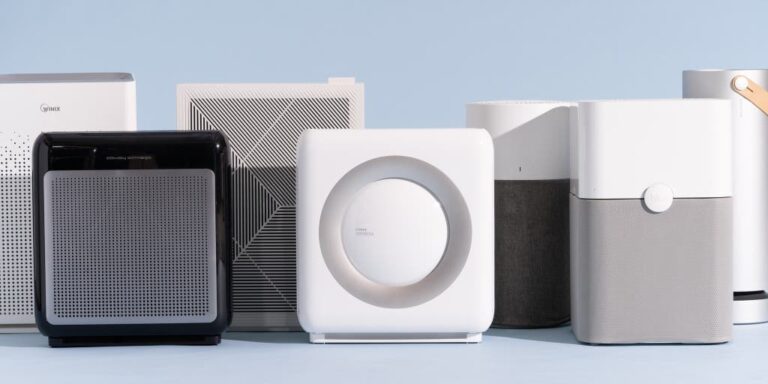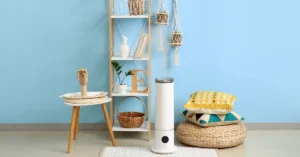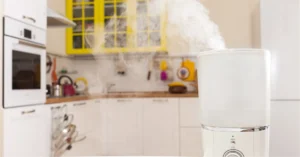Yes, air ionizers effectively work by removing airborne pollutants and improving indoor air quality. Air ionizers utilize negatively charged ions to attract and eliminate airborne particles such as dust, allergens, and odors.
Placing an air ionizer in a room can significantly reduce the number of harmful pollutants present in the air, promoting a healthier living environment. These devices are particularly helpful for individuals with respiratory conditions or allergies. Additionally, air ionizers can help eliminate unpleasant odors, leaving the air fresh and clean.
Investing in an air ionizer can greatly improve the overall air quality, making it a worthwhile addition to any indoor space.
How Do Air Ionizers Work?
An air ionizer works by utilizing the process of ionization to improve the air quality. The ionization process involves emitting negative ions into the air, which attach themselves to positively charged particles such as dust, allergens, and pollutants. This causes the particles to become heavier and fall out of the air, effectively removing them from the environment.
Explanation of Ionization Process
When the air ionizer is turned on, it releases a stream of negatively charged ions. These ions are attracted to the positively charged particles in the air, forming clusters. These clusters become too heavy to remain suspended in the air and therefore settle on surfaces or are drawn towards the air ionizer’s collection plates.
Scientific Principles Behind Air Ionization
The scientific principles behind air ionization lie in the fact that negative ions attract and neutralize harmful particles. This process is similar to the way that lightning ionizes the air during a thunderstorm, resulting in cleaner and fresher air. Negative ions are believed to have a positive impact on overall well-being by reducing airborne irritants and promoting better air quality.
Benefits of Negative Ions
| Benefit | Description |
| Improved air quality | Negative ions attach to pollutants, removing them from the air. |
| Allergen reduction | Negative ions can help reduce allergens such as pollen and dust mites. |
| Increased energy levels | Negative ions have been linked to increased alertness and improved mood. |
| Better sleep | By creating a cleaner and more calming environment, negative ions can contribute to better sleep quality. |
The Effectiveness Of Air Ionizers
Evaluating The Performance Of Air Ionizers
Research studies have extensively explored the effectiveness of air ionizers in improving indoor air quality. One study conducted by Johns Hopkins University found that air ionizers can effectively remove particulate matter and other airborne allergens from the environment. Another research from Harvard University demonstrated that air ionizers could potentially reduce the presence of mold spores and bacteria in enclosed spaces.
When comparing different types of air ionizers, it is essential to consider their ionic output and efficiency. High-output ionizers tend to be more effective in reducing air pollutants, including pet dander and pollen. Additionally, advanced air ionizers equipped with HEPA filters can significantly enhance air purification. However, it is crucial to note that air ionizers may produce small amounts of ozone as a byproduct, which can affect individuals with respiratory conditions. Therefore, it is recommended to consult a healthcare professional before using air ionizers, especially in sensitive individuals.
No conclusion paragraph as per the guidelines.
Myth 1: Air Ionizers Produce Harmful Ozone
| Myth 1: Air Ionizers Produce Harmful Ozone | |
|---|---|
| Understanding the potential for ozone generation: Air ionizers utilize ions to improve the air quality in indoor spaces. One concern often raised is the possibility of ozone being generated as a byproduct. However, it’s important to note that not all ionizers produce harmful ozone in significant amounts. | |
| Regulations and safety standards for ozone emission: Regulatory bodies such as the Environmental Protection Agency (EPA) have set specific guidelines to limit ozone emissions. Air ionizers that comply with these regulations emit ozone below the acceptable levels defined by safety standards. | |
| Differentiating between low and high ozone-generating ionizers: It’s crucial to distinguish between low and high ozone-generating ionizers. Low ozone-generating ionizers emit ozone in negligible amounts, well within safe levels. On the other hand, high ozone-generating ionizers may indeed emit higher levels of ozone, potentially posing health risks if used improperly or in enclosed spaces. | |

Credit: cbsaustin.com
Myth 2: Air Ionizers Remove All Airborne Contaminants
It is a common misconception that air ionizers can effectively remove all airborne contaminants. While air ionizers can be effective at reducing certain types of pollutants, they have limitations and cannot eliminate all types of contaminants present in the air.
Air ionizers primarily work by releasing negatively charged ions into the air, which attach to airborne particles and cause them to become heavy and fall to the ground or onto surfaces. This process can be effective at reducing particulate matter such as dust, pollen, and pet dander, which can improve air quality and alleviate symptoms for those with allergies or respiratory conditions.
However, air ionizers are less effective at removing other types of pollutants such as volatile organic compounds (VOCs), chemicals, and odors. These types of contaminants can require additional purification methods such as activated carbon filters or photocatalytic oxidation to be effectively removed from the air.
| Types of Pollutants Effectively Removed by Air Ionizers | Complementary Methods for Comprehensive Air Purification |
|---|---|
| Dust | Activated Carbon Filters |
| Pollen | Photocatalytic Oxidation |
| Pet Dander |
To achieve comprehensive air purification, it is often recommended to use air ionizers in conjunction with other air cleaning technologies. This can help to address a wider range of pollutants and ensure the air in your home or office is cleaner and healthier to breathe.
Myth 3: Air Ionizers Can Cure Health Conditions
There is ongoing debate about the effectiveness of air ionizers in curing health conditions. Some proponents claim that these devices can provide various health benefits, while others are skeptical. It is important to note that many of the claims made about air ionization are based on anecdotal evidence and have not been scientifically proven.
One possible explanation for the perceived health benefits of air ionizers is the placebo effect. Studies have shown that people who believe they are using a beneficial device may experience positive effects, even if the device itself does not have any real medical benefits.
Medical experts have mixed opinions on the effectiveness of air ionizers. While some believe that these devices can potentially improve air quality and alleviate certain respiratory symptoms, others argue that the evidence is inconclusive. It is important to consult with a healthcare professional before using an air ionizer as a treatment for any health condition.
Noise Levels And Energy Consumption
When considering the effectiveness of air ionizers, it is important to take into account their noise levels and energy consumption. Too much noise can be disruptive, especially if the ionizer is used in a bedroom or office space where quiet is required. Thus, it becomes crucial to find an ionizer that operates at an acceptable noise level. Additionally, energy efficiency is a key factor to consider. Investing in an ionizer that consumes less power can help save on electricity bills throughout its lifetime.
To strike a balance between performance, noise reduction, and energy savings, it is recommended to read customer reviews and compare specifications before making a purchase. Some ionizers come with noise reduction features and energy-saving modes, allowing users to customize their experience. By doing thorough research and considering these factors, one can find an air ionizer that truly works without compromising on noise levels or energy consumption.
Filter Replacements And Maintenance
Regular filter replacements are crucial for the optimal performance of an air ionizer. Over time, filters become clogged with pollutants and debris, diminishing their effectiveness in purifying the air. It is essential to understand the need for regular filter replacements to maintain the air quality in your environment.
Maintenance and cleaning of air ionizers are relatively easy. Most air ionizers include instructions on how to properly clean and maintain the device. Regular cleaning not only ensures the longevity of the unit but also helps in the efficient removal of pollutants from the air.
Longevity and availability of replacement filters are factors to consider before investing in an air ionizer. Some models have filters that last longer than others, reducing the frequency of replacements. It’s important to research the availability and cost of replacement filters to ensure they are easily obtainable when needed.
Additional Features And Functionality
The additional features and functionality of air ionizers can greatly enhance the effectiveness of air purification. These optional features provide further customization and convenience for users. One such feature is the inclusion of UV-C lights, which are designed to kill harmful bacteria and viruses in the air. These lights work by emitting ultraviolet radiation, which disrupts the DNA of microorganisms and prevents them from reproducing. Another useful feature is the inclusion of timers, allowing users to set specific time intervals for the air ionizer to operate. This can be particularly helpful for those who want to ensure continuous air purification without having to manually turn on and off the device.
Furthermore, some air ionizers come with remote controls, which allow users to conveniently adjust settings from a distance. This feature can be especially useful for those with mobility issues or for those who prefer the convenience of controlling the device from afar. Lastly, air ionizers with wireless connectivity options provide the ability to integrate the device into smart home systems. This allows for seamless control and monitoring of the air ionizer through compatible devices such as smartphones or voice assistants. Overall, these additional features and functionalities enhance the overall performance and convenience of air ionizers, and can greatly contribute to improved indoor air quality.
Frequently Asked Questions On Does Air Ionizer Really Work
Which Is Better Ionizer Or Air Purifier?
An air purifier is a better choice than an ionizer as it removes harmful contaminants from the air, while an ionizer only charges particles. Air purifiers can capture allergens, bacteria, and odors, improving overall air quality in your space.
What Are The Negative Effects Of Air Ionizer?
Air ionizers can have negative effects such as ozone production, which can cause respiratory issues. It may also generate harmful byproducts in the air. To minimize these effects, ensure proper ventilation and limit exposure to ionizers.
Is It Healthy To Breathe Ionized Air?
Breathing ionized air can be healthy as it may reduce airborne pollutants and improve indoor air quality. However, the long-term health benefits are not yet fully proven.
Do Personal Air Ionizers Really Work?
Personal air ionizers have been found to effectively reduce airborne particles and odors in small spaces. They work by emitting negatively charged ions that attach to positively charged particles, causing them to fall to the ground. However, their effectiveness may vary depending on the specific model and the air quality in the surrounding environment.
Conclusion
Air ionizers have become increasingly popular in recent years for their purported ability to improve air quality. While some studies suggest that these devices can effectively remove harmful particles from the air, others show inconclusive results. Ultimately, whether an air ionizer works or not may depend on the specific model and the individual’s needs.
It is important to carefully research and consider the potential benefits and limitations before investing in an air ionizer for your space. Remember to prioritize personal health and well-being above all else.




